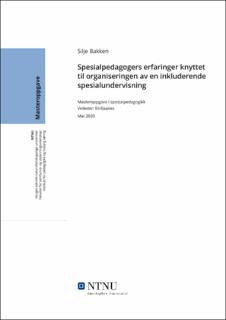| dc.contributor.advisor | Raanes, Eli | |
| dc.contributor.author | Bakken, Silje | |
| dc.date.accessioned | 2021-09-28T17:36:36Z | |
| dc.date.available | 2021-09-28T17:36:36Z | |
| dc.date.issued | 2020 | |
| dc.identifier | no.ntnu:inspera:53268456:22217095 | |
| dc.identifier.uri | https://hdl.handle.net/11250/2784631 | |
| dc.description.abstract | I denne kvalitative studien har jeg intervjuet spesialpedagoger på tre ulike skoler. Formålet var å få innblikk i deres synspunkter og erfaringer knyttet til hvordan spesialundervisningen er organisert for å ivareta en inkluderende opplæring for de elevene som mottar spesialundervisning. Problemstillingen er: «Hvilke erfaringer har spesialpedagoger knyttet til det å skulle ivareta en inkluderende spesialundervisning?». For å finne svar på problemstillingen stilte jeg spørsmål om hvordan spesialundervisningen ble planlagt, organisert og gjennomført med tanke på inkludering, samt hvilke utfordringer spesialpedagogene følte de støtet på når det kom til det å skulle ivareta en inkluderende spesialundervisning.
I arbeidet med analysen og tolkningen av datamaterialet kom jeg fram til fire kategorier: organisering, inkludering, klassefellesskap og medbestemmelse. Gjennom intervjuene med de tre spesialpedagogene kom det fram at en praktisering av spesialundervisningen utenfor klasserommet var den vanligste formen for organisering. En slik organisering ble begrunnet med utgangspunkt i elevenes beste, samt et faglig fokus der undervisningen ble forankret i den enkelte elevs individuelle opplæringsplan (IOP). Inkludering var imidlertid noe som alltid var i tankene hos spesialpedagogene, og samarbeidsoppgaver og gruppeundervisning ble nevnt som eksempler på måter å få flere elever til å mestre innenfor rammene av den ordinære opplæringa. I tillegg praktiserte to av skolene en organiseringsform der de rullerte på hvilke elever som ble tatt med ut av klasserommet. Dette bidro til å normalisere det å få sin undervisning et annet sted enn inne i klasserommet. Det ble påpekt at klassefellesskapet og hvilke holdninger man hadde knyttet til spesialundervisning ikke bare var viktig med tanke på hvordan dette ble oppfattet hos elevene selv, men også hos medelevene. Å fokusere på at alle har ulike styrker og svakheter, ble derfor sett på som viktig i arbeidet med å skape et godt klassemiljø. Ved siden av en bevissthet omkring klassefellesskapets betydning for elevenes følelse av inkludering, ble også medbestemmelse ansett som viktig. Spesialpedagogene mente at elevene skulle få være med på å påvirke innhold, organisering og gjennomføring av den undervisningen som ble gitt. Selv om alle spesialpedagogene hadde en bevissthet omkring hvordan deres organisering og gjennomføring av spesialundervisningen kunne påvirke en elevs følelse av inkludering, var det enighet om at idealet om en inkluderende spesialundervisning inne i klasserommet ofte vanskelig lot seg realisere med en praktisering som hadde et faglig fokus. | |
| dc.description.abstract | In this qualitative study, I interviewed special education teachers at three different schools. The purpose of the study was to get knowledge about their aspects and experiences related to organisation of special education. And how they attend inclusive education for those of the students receiving special education. The problem of the research is: “What experiences do special educators have related to how to provide an inclusive special education?”. To find the answers to the problem of the research, I asked several questions about how the special education was planned, organised and implemented. In addition, I wanted their thoughts about inclusion, as well as the challenges they encountered in their daily work.
During the work with the analysis and interpretation of the data material, I ended up with four categories: organisation, inclusion, class community and codetermination. The interviews with the three special educators made it clear that the most common form of organization of the special education was outside the classroom. This type of organisation was justified by the pupils common good, as well as an academical focus where the teaching was based on the pupils individual education plan (IOP). However, inclusion was something that the special education teachers always had in mind. Collaborative assignments and group teaching were examples of how more students could master within the framework of ordinary education. In addition, two of the schools practiced an organisation were different pupils were taken out of the classroom for individual teaching. This helped to normalize the aspect of receiving their teaching outside the classroom. It was pointed out that the class community and the attitudes to special education were important both for the pupils who were receiving this education, and for the fellow pupils. Focusing on the fact that everyone has different strengths and weaknesses was seen as an important part of the work to create a good classroom environment. Codetermination was also considered important for the pupil’s experiences of influencing the content, organisation and implementation of the teaching. All special education teachers had an awareness of how their organisation and implementation of special education could affect a pupils sense of inclusion. However, the aim of an inclusive special education in the classroom was often difficult to realize with a teaching that had an academic focus. | |
| dc.language | nob | |
| dc.publisher | NTNU | |
| dc.title | Spesialpedagogers erfaringer knyttet til organiseringen av en inkluderende spesialundervisning | |
| dc.type | Master thesis | |
